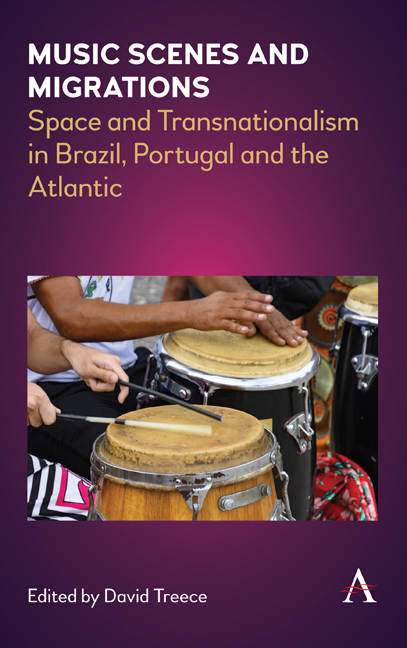Book contents
- Frontmatter
- Contents
- List of Illustrations
- Acknowledgements
- Introduction
- Part 1 Colonial and Postcolonial Transnationalisms, Migrations and Diasporas
- Part 2 Relocating Rio de Janeiro
- Part 3 Demetropolitanizing the Musical City: Other Scenes, Industries, Technologies
- Notes on Contributors
- Notes
- References
- Index
Chapter 17 - Another Music in a Different (and Unstable) Room: ARoute through Underground Music Scenes inContemporary Portuguese Society
Published online by Cambridge University Press: 20 January 2022
- Frontmatter
- Contents
- List of Illustrations
- Acknowledgements
- Introduction
- Part 1 Colonial and Postcolonial Transnationalisms, Migrations and Diasporas
- Part 2 Relocating Rio de Janeiro
- Part 3 Demetropolitanizing the Musical City: Other Scenes, Industries, Technologies
- Notes on Contributors
- Notes
- References
- Index
Summary
In this brief essay I trace a path through thesociology of culture and the arts in terms ofapproaches to DIY (‘do-it-yourself ’) andunderground music scenes in contemporary Portuguesesociety. My theoretical perspective is eclectic andmultidisciplinary – from the ‘founding fathers’ ofsociology (namely Max Weber 1998) to the most recentpostsubcultural studies (see Guerra 2015). Fromthese starting-points I have developed a researchprogramme focused on the various music scenespresent in Portuguese society since the late 1970s.In particular, I seek to note the dynamics shapingthe underground Portuguese music scenes, unravellingtheir contamination, hybridism and singularity on anational scale. Accordingly, I emphasize thecentrality of cities and urban scenes in theformation and mediation inherent in the practices,relations and traditions of music dynamics. Figure17.1 shows the Mão Morta Gig at the Cinema Império,Lisbon.
Primordial Trails: From Irrelevance toConsolidation in the Sociological Knowledge ofMusic
It was only in 1970 that a profound interest in cultureand the arts emerged in sociology alongside otherdisciplinary fields, breaking with the notion of thefield as eccentric, dilettante and marginal, at atime when the cleavages between sociology, arthistory and literary criticism were beginning tonarrow. This renewed interest in the problem ofculture took place in a wider context of change,deeply rooted in the growing importance of debateson feminism, Marxism (specifically its heterodoxapproaches), poststructuralism, semiology andpsychoanalysis. This is the framework in which thestudy of music and its cultural and social dynamicsbegan to gather interest among researchers.Notwithstanding the long history of the theme insociological analysis, going back to the ‘foundingfathers’ of the discipline, Max Weber (1998) wasresponsible for placing music on the sociological‘agenda’ by contributing to a more completeunderstanding of music production. Despite this bodyof work, music remained at the periphery ofsociological theory for a long time.
In truth, it was only after the 1940s, through theFrankfurt School and its Critical Theory approach,namely in the person of Theodor W. Adorno (1962,2003, 2006), that the position of music insociological analysis was reversed. The work ofGeorg Simmel (2004) is of particular relevancehere.
- Type
- Chapter
- Information
- Music Scenes and MigrationsSpace and Transnationalism in Brazil, Portugal and the Atlantic, pp. 185 - 194Publisher: Anthem PressPrint publication year: 2020



